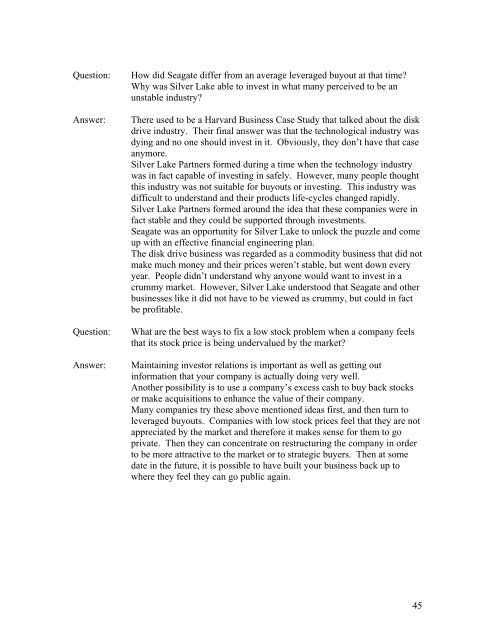Melissa Bockhold Heather Coddington - Franklin College
Melissa Bockhold Heather Coddington - Franklin College
Melissa Bockhold Heather Coddington - Franklin College
You also want an ePaper? Increase the reach of your titles
YUMPU automatically turns print PDFs into web optimized ePapers that Google loves.
Question: How did Seagate differ from an average leveraged buyout at that time?<br />
Why was Silver Lake able to invest in what many perceived to be an<br />
unstable industry?<br />
Answer: There used to be a Harvard Business Case Study that talked about the disk<br />
drive industry. Their final answer was that the technological industry was<br />
dying and no one should invest in it. Obviously, they don’t have that case<br />
anymore.<br />
Silver Lake Partners formed during a time when the technology industry<br />
was in fact capable of investing in safely. However, many people thought<br />
this industry was not suitable for buyouts or investing. This industry was<br />
difficult to understand and their products life-cycles changed rapidly.<br />
Silver Lake Partners formed around the idea that these companies were in<br />
fact stable and they could be supported through investments.<br />
Seagate was an opportunity for Silver Lake to unlock the puzzle and come<br />
up with an effective financial engineering plan.<br />
The disk drive business was regarded as a commodity business that did not<br />
make much money and their prices weren’t stable, but went down every<br />
year. People didn’t understand why anyone would want to invest in a<br />
crummy market. However, Silver Lake understood that Seagate and other<br />
businesses like it did not have to be viewed as crummy, but could in fact<br />
be profitable.<br />
Question: What are the best ways to fix a low stock problem when a company feels<br />
that its stock price is being undervalued by the market?<br />
Answer: Maintaining investor relations is important as well as getting out<br />
information that your company is actually doing very well.<br />
Another possibility is to use a company’s excess cash to buy back stocks<br />
or make acquisitions to enhance the value of their company.<br />
Many companies try these above mentioned ideas first, and then turn to<br />
leveraged buyouts. Companies with low stock prices feel that they are not<br />
appreciated by the market and therefore it makes sense for them to go<br />
private. Then they can concentrate on restructuring the company in order<br />
to be more attractive to the market or to strategic buyers. Then at some<br />
date in the future, it is possible to have built your business back up to<br />
where they feel they can go public again.<br />
45

















